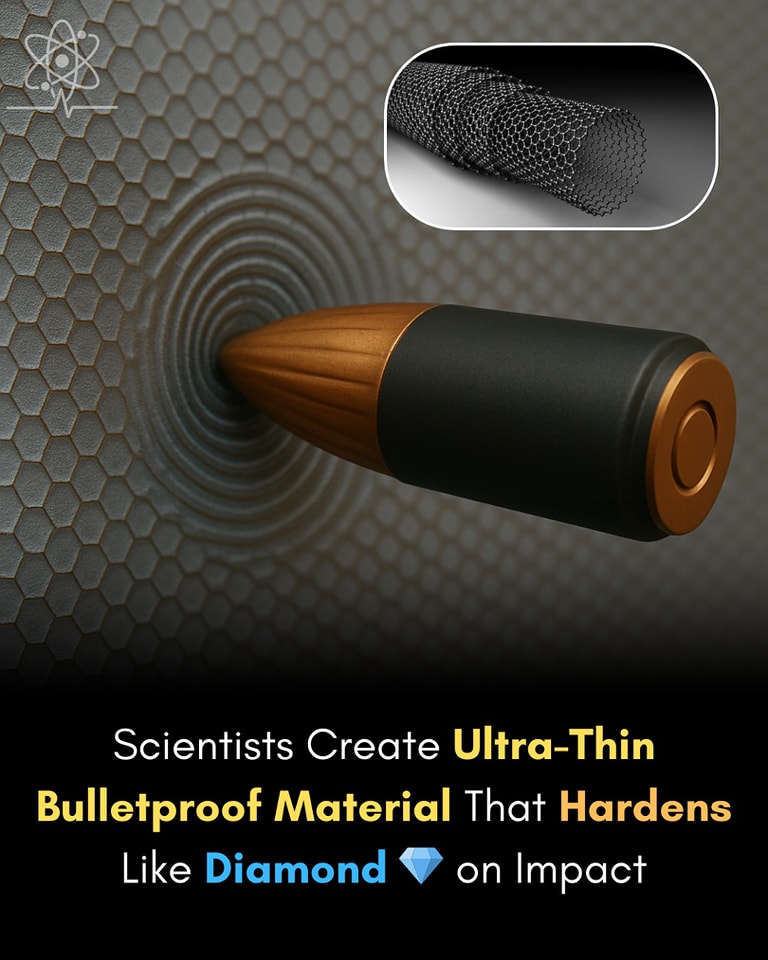Scientists have developed a remarkable new material named Proteus that has the ability to stop bullets while being ultra-thin and lightweight.
This material hardens instantly upon impact, behaving in a way similar to diamond, making it extremely difficult to penetrate.
The innovation draws inspiration from natural structures like grapefruit peels and abalone shells, which are known for their unique ability to absorb and disperse energy effectively.
Proteus is made by embedding hard ceramic spheres within a flexible aluminum structure. When a bullet or drill strikes the material, it reacts dynamically.
The ceramic particles inside begin to vibrate at high frequencies, which blunts the projectile and spreads the force across the structure, making it nearly impenetrable. This combination of flexibility and extreme toughness is unlike anything seen in conventional body armor materials.
Researchers from the University of Surrey and the Leibniz Institute conducted extensive studies on Proteus and confirmed its unique properties.
It falls under a category of materials known as non-Newtonian substances, meaning it behaves differently under varying types of force. Under sudden, high-speed impacts, it transitions from soft and flexible to extremely hard, stopping bullets and tools alike.
This innovation has wide-ranging potential applications. It could revolutionize body armor for military and law enforcement, allowing for lighter gear that still offers full protection.
It could also be used in protective casings for vehicles, secure storage containers, and bullet-resistant building materials. With Proteus, the future of protective technology looks thinner, stronger, and smarter.
This material hardens instantly upon impact, behaving in a way similar to diamond, making it extremely difficult to penetrate.
The innovation draws inspiration from natural structures like grapefruit peels and abalone shells, which are known for their unique ability to absorb and disperse energy effectively.
Proteus is made by embedding hard ceramic spheres within a flexible aluminum structure. When a bullet or drill strikes the material, it reacts dynamically.
The ceramic particles inside begin to vibrate at high frequencies, which blunts the projectile and spreads the force across the structure, making it nearly impenetrable. This combination of flexibility and extreme toughness is unlike anything seen in conventional body armor materials.
Researchers from the University of Surrey and the Leibniz Institute conducted extensive studies on Proteus and confirmed its unique properties.
It falls under a category of materials known as non-Newtonian substances, meaning it behaves differently under varying types of force. Under sudden, high-speed impacts, it transitions from soft and flexible to extremely hard, stopping bullets and tools alike.
This innovation has wide-ranging potential applications. It could revolutionize body armor for military and law enforcement, allowing for lighter gear that still offers full protection.
It could also be used in protective casings for vehicles, secure storage containers, and bullet-resistant building materials. With Proteus, the future of protective technology looks thinner, stronger, and smarter.
Scientists have developed a remarkable new material named Proteus that has the ability to stop bullets while being ultra-thin and lightweight.
This material hardens instantly upon impact, behaving in a way similar to diamond, making it extremely difficult to penetrate.
The innovation draws inspiration from natural structures like grapefruit peels and abalone shells, which are known for their unique ability to absorb and disperse energy effectively.
Proteus is made by embedding hard ceramic spheres within a flexible aluminum structure. When a bullet or drill strikes the material, it reacts dynamically.
The ceramic particles inside begin to vibrate at high frequencies, which blunts the projectile and spreads the force across the structure, making it nearly impenetrable. This combination of flexibility and extreme toughness is unlike anything seen in conventional body armor materials.
Researchers from the University of Surrey and the Leibniz Institute conducted extensive studies on Proteus and confirmed its unique properties.
It falls under a category of materials known as non-Newtonian substances, meaning it behaves differently under varying types of force. Under sudden, high-speed impacts, it transitions from soft and flexible to extremely hard, stopping bullets and tools alike.
This innovation has wide-ranging potential applications. It could revolutionize body armor for military and law enforcement, allowing for lighter gear that still offers full protection.
It could also be used in protective casings for vehicles, secure storage containers, and bullet-resistant building materials. With Proteus, the future of protective technology looks thinner, stronger, and smarter.
0 Comments
·0 Shares
·26K Views
·0 Reviews


